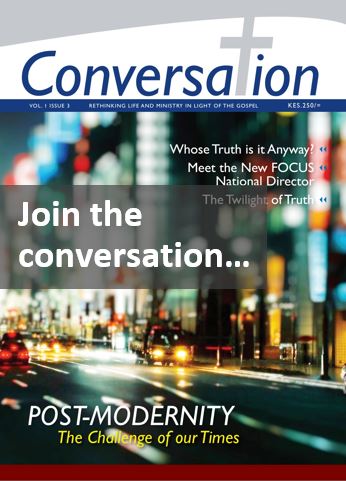
Sometimes Gospel ministry feels like working at the ER (emergency room) or being a firefighter. It’s one crisis after another, one emergency after another and one fire after another. A brother’s marriage is falling apart and we rush to salvage the remains of their relationship. That sister church is on the brink of division and we quickly deploy a rescue team. A friend is facing a financial crisis and we wear our financial management caps. Every day brings with it a new crisis and even when we take a break we know it’ll be short-lived because crisis is the norm. For some people that’s what Gospel ministry is all about. Dress up ready for the next crisis. The problem with this approach to ministry is that it’s not sustainable. Actually, before we know it we’ll find ourselves falling into crisis. There’s also no telling how many others are neglected along the way as we rush to save the most vulnerable. If hospitals only had ERs soon every “small” illness would end up as an emergency. It’s the small fires neglected today that burn us down tomorrow.
This means that while we need the grace to serve in and out of season we also need the wisdom to plan before time. The thing about effective ERs and firefighting departments is they plan for fires months and years before they happen. They assume any place will catch fire even inside their own office and plan accordingly. They play out every crisis scenario and prepare for it. They train for a hundred hours for those few minutes of madness. So when it happens they are not running in a rat race trying to figure out what to do. Instead, they are applying their training with zeal to help those in need but also with a readiness to be tested. Could we try that with our ministry approach? It sounds crazy to assume the worst-case scenario in our ministry meetings. But working with sinful people in a broken world means it’s never farfetched to assume the worst will happen. It’s only a matter of time before we have to deal with the unthinkable and do so with no prior warning or preparation whatsoever.
But we trust the Lord?
Someone might ask, won’t we be digging our own holes when we expect the worst to happen? What about our superstition that says if you think about bad things they’ll happen? And what about expecting good things from the Lord and giving people the benefit of the doubt? All valid questions especially on this side of the globe. We are good Christians who trust the Lord and expect the best outcome. It’s no wonder we are among the happiest people in the world. All too good. But the same word that tells us to cling unto Jesus as our anchor in distress also reminds us that we are swimming in dangerous waters. It says here we have no home and if our Saviour faced trouble so will we. It says we have an enemy within, our own sin. Enemies around us, the indwelling sin of our fellow brothers and sisters and sin in the community we live in. In this regard, a biblical Christian is to be both peace-loving as a dove and yet as wise and ready as a serpent, Matthew 10:16. We are to have our head in every situation, 2 Tim 4:5. To be ready for bad times not burying our heads in the sand.
Expecting the Worst is Spiritual
So assuming I’ve convinced you to change approach then you might ask, how do we go about this? I thought you’d never ask. First, let’s accept that expecting the worst is no less spiritual compared to expecting the best outcome. We pray for the best but we prepare for the worst. We wait for the crown while carrying the cross. Second, let’s agree that giving people the benefit of the doubt should also be balanced with the reality that they are sinners living in a broken world. Yes, a pastor can cheat and a ministry leader can steal. And yet they can be as generous and loving as the next Romeo. Don’t be naive. Also, don’t spritualise everything. Remember a male pastor is still a man. A sister in Christ is still a daughter of Eve. Finally, and I really hope we can be convinced of this, let’s agree that planning for the worst is not an aside to our ministry but a good part of loving and serving people. What would we rather do, play it safe until the worst hits and you start running like a madman or do ministry with preparedness for whatever comes? I think the latter is actually more godly, more loving and more spiritual.
Imagine All Outcomes
I would suggest next time we meet let’s survey our pressure points and check areas of vulnerability. Play out every possible outcome and not theoretically like some random game. No, let’s brainstorm all the things that could go wrong starting from inside and going outside. Those in leadership are the ones who would cause us the greatest harm. Start with the leader and the ministry team then move to the departmental leaders and the ministry as a whole. Build accountability at every level, and for heavens’ sake stop spiritualising everything. But also think about all the things that could work out so well. One to balance the mood but also prepare for the gaps that success might create. Yes, I must say being richly blessed can also expose our vulnerabilities. It’s the good days that we enjoy as a ministry that often blind us of the crisis that looms ahead. Supermarkets and planes almost always fall apart when they are about to make it. I’m not saying be a downer or a nosy rosy. Instead, we take God’s blessings with gratitude but all while remembering we are still not at home.
Play Offence not just Defence
The problem with fighting fires is that you are always playing defence. You are responding and mostly reacting with little preparation. What if we changed the approach? Prepare for the fire long before someone lights the matchbox. Take the case of the sin that could easily break a relationship and make one endanger their own faith and ministry. Do you know what that is to you? What is your idol and what about the idols of your team? Where are they most tempted and how are you protecting yourselves. But if you are afraid to poke noses in your team and open the Pandora box, then check around. What is happening around your ministry circle? What kind of sins are leaders falling into? What temptations are besetting your target people group? Stretch further beyond your theological constituency. What’s happening there? Don’t say that would never happen to you or your team. When it comes to sin and the brokenness of this world we are more similar than we are different. We are capable of a lot more than we imagine. But above all we need to ask, how are we feeding our people? Is the meal they take regularly biblically enriching or are they actually malnourished. Are we giving them the arsenal they need for the day of calamity? Or are we just waiting until the ugly unravels before our eyes? Play offence and learn from others.












